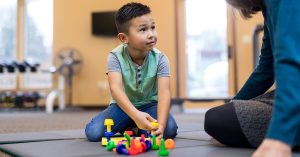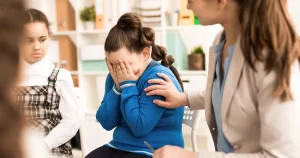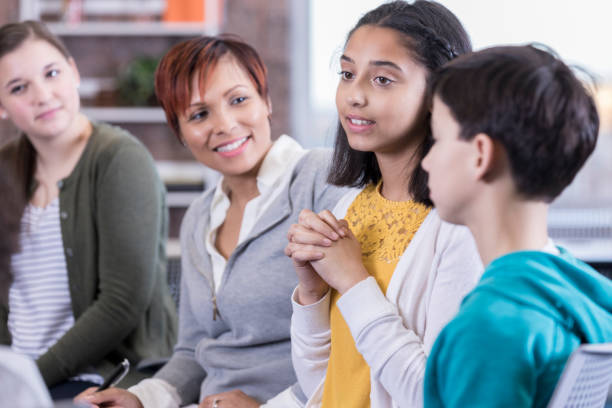Contents
- 1 What Is Group Therapy For Children?
- 2 Signs A Child Need Therapy
- 3 Why Is Group therapy Beneficial For Children?
- 4 Types Of Group Therapy
- 5 How To Prepare For a Group Therapy Session?
- 6 How To Talk to Your Child About Group Therapy?
- 7 Risk Of Group Therapy For Children
- 8 How To Gets Most Out Of Therapy Sessions?
- 9 How To Find Right Group Therapy Program For Children?
- 10 Conclusion
- 11 A Word From Therapy Mantra
What Is Group Therapy For Children?

Group therapy is a form of counseling that takes place with a group of people, typically five to eight, who share a common problem or issue. In this therapy, participants discuss their problems and feelings with one another in a safe and supportive environment. Group therapy for children can be beneficial because it allows them to share their experiences with others who are going through similar things, learn from others’ experiences, and build relationships with peers who can offer support.
There are many reasons why group therapy can be good. For one, it is a safe place to share your thoughts and feelings with other people who have the same problem. It is also a place where you can learn from others’ experiences or just have fun being around people who like the same things as you. It is a place where you can meet and talk with people who have the same interests as you. A group of children working together to figure out how to solve their problems can be very powerful and assist in moving past their difficulties.
Signs A Child Need Therapy
- Has difficulty making friends
- Difficulty coping with life changes
- Is easily overwhelmed emotionally
- Self-harms or has suicidal thoughts/tendencies
- Experiences extreme mood swings on a regular basis
- Engages in risky behavior such as drugs/alcohol, promiscuity, or violence
- Has trouble expressing their emotions verbally- using sarcasm, physical aggression, or violence instead of words
Why Is Group therapy Beneficial For Children?

Group therapy for children provides them opportunities to:
- Share thoughts and feelings in a safe environment
- Learn from other’s experiences
- Make friends with others who are going through similar things
- Build relationships with peers who can offer support
The benefits of group therapy can give children the confidence they need to move forward in their lives. Group therapy should be considered for children who are struggling with anxiety, depression, behavioral problems, PTSD, suicidal behaviors/thoughts, etc. Group therapy allows children to find other children their own age who are experiencing similar issues. This may allow them to open up more freely about what is troubling them. This will also give the therapist the opportunity to observe their behavior during class time while receiving feedback from other students in the group session. It also creates positive peer relationships where students can support each other. Through difficult times while learning coping skills to deal with their problems.
Types Of Group Therapy
There are so many different types of groups for children. If you have something in common, there is probably a group out there for it. Some examples include Music Therapy, Art Therapy, Cognitive Behavioral Therapy, Play Therapy, Trauma Focused-CBT (TFCBT), and Expressive Arts.
- Music therapy uses the power of music to help children work through their problems.
- Art therapy uses art materials and discussion to explore a child’s personal feelings, issues and experiences.
- Play therapy is a form of psychotherapy for children through play.
- Cognitive-behavioral therapy (CBT) is based on the idea that our thoughts cause our feelings and behaviors, not external things like people, situations, or events. With this idea in mind, we can change the way we think to feel and act better even if the situation does not change. CBT has been shown to be an effective treatment for many mental health difficulties including anxiety, depression, anger/hostility, substance abuse problems, suicidal thinking, and more.
- Expressive arts therapies use the creative process of art, music, drama, or writing to explore thoughts and feelings.
- Trauma-focused CBT (TF-CBT) is a very specific type of Cognitive Behavioral Therapy that was designed for children who are experiencing symptoms related to trauma. It has been proven to be an effective treatment for children with anxiety disorders, mood disorders, posttraumatic stress disorder (PTSD), depression, behavioral problems, and disruptive behaviors.
5-8 people attend sessions Each session lasts one hour. There are typically four groups per day. The therapist should be there at all times. Parents are encouraged to participate in these sessions
How To Prepare For a Group Therapy Session?

- Bring a list of your child’s strengths and accomplishments
- Bring a list of things your child enjoys doing
- Ask questions about the group therapy sessions at the beginning, during, and end of each session. Parents should ask open-ended questions to get their children talking. Don’t be afraid to share your feelings with others in the group or share positive feedback when you see great improvements from your child.
Parents can support their children by being supportive from start to finish! Keep an open mind when it comes to joining a new group that focuses on therapeutic goals. Everyone is there for different reasons, but all want improvement! Parent involvement is important because they are the primary figures in their lives. This gives them the opportunity to learn more about their children and what is bothering them. Group sessions will allow parents to get a better understanding of their child’s feelings, thoughts, and even behaviors. Parents should be aware of how often they are communicating with their children on a daily basis. Having an open line of communication between parent and child is important because it allows the therapist to get a better understanding of what may be going on in your household that might be triggering certain emotional reactions from the child.
How To Talk to Your Child About Group Therapy?
- The therapist should be able to answer all questions your child may have regarding group therapy. If you still feel uneasy about the idea of group therapy for your child, then it would be best not to force them into joining. If you do decide to go ahead with it, then speak with a family counselor and ask if there is a way they can help introduce this new experience to the child.
- Explain that each person in the therapy room has a unique story but they all share one common goal – to learn ways to help with their past and current problems so they can improve as a person.
- Let your child know that everyone in the group wants to have your child feel comfortable enough to openly express themselves without being judged or ridiculed.
Therapist

The therapist should be well versed in all aspects of child therapy including the importance of play therapy. Some therapists may also specialize in cognitive behavioral therapy, family systems theory, and/or psychodynamic psychotherapy which might also help children improve problem behaviors more efficiently. If a group is a better option for your child’s specific needs, then it would be best to look for a therapist who has experience working with groups.
Make sure you feel comfortable communicating with the therapist and have open communication lines at all times. This is an important component when looking for a good fit between you and your child’s future therapists!
Parents
Group sessions will require active parent involvement. Some therapists will ask you to be present during the entire session while others might request that you come in for at least one weekly session. If it is a play therapy group, then parents should expect to see their children’s artwork as well as written reports from their children regarding how they feel about each week’s topic or activity.
The therapist may ask that you attend some individual sessions with your child to help him/her open up more about what is going on in their life. This allows the therapist to get a better understanding of how the issues at home may be affecting your child while they are away from you.
Risk Of Group Therapy For Children
 Group therapy is a good idea when you are having problems. You can tell your child’s therapist about them and they will help you. Group therapy means that other kids have the same problems as you do. They can help each other, too. They can support each other, so they don’t feel bad anymore.
Group therapy is a good idea when you are having problems. You can tell your child’s therapist about them and they will help you. Group therapy means that other kids have the same problems as you do. They can help each other, too. They can support each other, so they don’t feel bad anymore.
- Group therapy might be risky for some children because it takes time to do group therapy and
- It may be hard to get there so often or have parents at the sessions with them. Because parents are busy with work or something else that is happening in their lives too.
- That is why sometimes solution-focused brief therapeutic interventions are better for some children. Because it helps them get over their stuff quicker than doing full group sessions all the time.
How To Gets Most Out Of Therapy Sessions?
Parents should make sure that they are involved in their kids’ therapy. Sometimes, the therapist will want you to come to the session with them. If it is a play therapy group, then they will want you to see your child’s artwork about what was talked about during the week. The therapist may also ask for some individual sessions so that your child can open up more about why they are feeling sad or scared at school or home.
- If you are having problems with your son or daughter, then group therapy might be perfect for them because it gives other kids who have the same issues as yours a chance to talk and work on things together. Parents can also help their kids get over what they are going through by coming to the sessions with them.
- If your child is struggling to make any positive changes or has trouble attending group therapy sessions, then it might be best to try solution-focused brief therapeutic interventions instead.
- Parents should always be involved in their children’s therapy because it helps them get better and it allows the therapists to see what is going on at home that might be affecting their child.
- Parents can help their kids who are having problems by coming to the sessions with them, so they can know they have someone there to support them. They should also make sure they are open about communicating with their children’s therapists to make sure their children are getting the best care possible.
How To Find Right Group Therapy Program For Children?

It can be difficult for parents to find the right group therapy program for their children because there are so many out there. Some programs are only for specific age groups or problems, while others are more general. It is important for parents to do their research and ask questions before enrolling their children in any program.
One of the best ways to find a good group therapy program is to ask other parents for recommendations. If your child is struggling with a specific problem, then it might be best to find a program that specializes in that issue. However, if your child is generally unhappy or has trouble coping with life. Then a more general program might be better.
Parents should always ask the therapist running the group therapy program questions about their credentials, experience, and training. It is important that the therapist leading the group has extensive knowledge of group therapy. Parents should also ask if they will be allowed to attend sessions with their children or participate in any family groups.
It can be difficult for parents to find the right program for their children because there are so many options out there. Some programs are only for specific age groups and problems while others are more general. It is important for parents to do their research and ask questions before enrolling their children in any program or therapy sessions.
Conclusion
Group therapy can be a very beneficial experience for children. It allows them to share their experiences and feelings with others who may be going through similar things. It can help them feel understood and supported. Group therapy can also teach children important social skills. Such as how to communicate effectively, how to problem solve, and how to build relationships. If you are considering group therapy for your child, make sure to do your research first. And find a therapist who is qualified and experienced in working with children.
A Word From Therapy Mantra
Your mental health — Your psychological, emotional, and social well-being — has an impact on every aspect of your life. Positive mental health essentially allows you to effectively deal with life’s everyday challenges.
At TherapyMantra, we have a team of therapists who provide affordable online therapy to assist you with issues such as depression, anxiety, stress, workplace Issues, addiction, relationship, OCD, LGBTQ, and PTSD. You can book a free therapy or download our free Android or iOS app.


